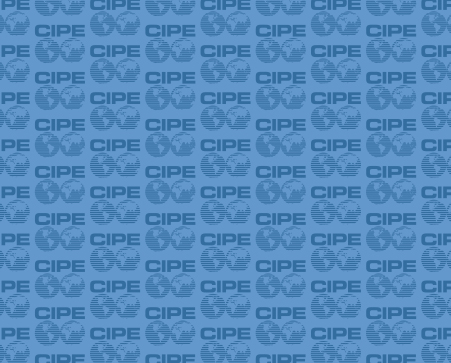
Nigeria’s upcoming elections have been attracting a lot of international attention because of the country’s population, economy, and political status, which are among the highest on the continent. Over the course of a few weeks in early 2015, Nigerians will elect state and national level leaders, including governors and the president.
While Nigerian civil society and the private sector have had difficulty in the past moving national political dialogue towards substance and policy, recent success has been seen at the state level. It is hoped that success will continue in the rhetoric surrounding the state elections, so much so that there can be spill-over into the national dialogue.
Over the past few years, the Center for International Private Enterprise (CIPE) has partnered with coalitions of business and professional associations in seven states across the North Central Zone and Enugu State. The partnerships have been centered on building the advocacy capacity of the various coalitions. Because Nigeria is has a federated system, civil society can attempt to effect change at the state level when it would prove too costly, inefficient, bureaucratic, or in a few cases too corrupt, at the national level.
Coalitions have seen success in areas of improved security, ease of doing business, and tax efficiency. Throughout September CIPE is hosting multiple three-day workshops entitled Strengthening Private Sector Participation in Elections to translate that success into an improved election process where voters and candidates focus on policy issues and results-oriented plans. CIPE is working with the International Republican Institute (IRI) so that on the final day of the workshop the coalitions can meet representatives from the major political parties and begin productive dialogue.
As of last week, two workshops had taken place with more scheduled through the month. Sentell Barnes of IRI tweeted the permeating message of the well-received workshop:
Day 2 of @IRIglobal & @CIPEglobal The business community has a vital role to play in building democracy in Nigeria. pic.twitter.com/kmUkNokB0E
— Sentell F. Barnes (@sentellbarnes) September 11, 2014
For the first workshop, CIPE and IRI brought together 35 participants from CIPE partner coalitions the Niger Coalition of Business and Professional Associations and the Plateau Coalition of Business and Professional Associations. The second workshop brought together 38 participants from two other CIPE partner coalitions, the Nasarawa Coalition of Business and Professional Associations and the Benue Coalition of Business and Professional Associations. At both workshops, IRI also brought state chapter representatives from Nigeria’s four major political parties: the People’s Democratic Party, the All Progressive Congress, the Labour Party, and the All Progressive Grand Alliance.
Election rhetoric has already begun at both the state and national levels in Nigeria. The coalitions plan to use the knowledge and connections gained from the workshop to raise the bar of electoral discourse through various means from platform policy suggestions to hosting gubernatorial debates centered on issues that actually affect individual citizens and their economy. The 2015 Nigeria elections are statistically the most contentious among political parties the country has ever seen. Hopefully, civil society and the private sector are able to harness the opportunity to show politicians the demand for leaders that address real issues and respond to the public.
CIPE Regional Director for Africa Abdulwahab Alkebsi, Program Officer for Africa Erica Poff, Nigeria Country Director Omowumi Gbadamosi, Nigeria Program Coordinator Desmond Irabor, and CIPE representative for West Africa Haroune Sidatt led the workshop. Training sessions were also facilitated by IRI Resident Program Officer Sentell Barnes, Chairman of the Nigerian Electoral Debates Group Aremo Taiwo Allimi, and International Foundation for Electoral Systems Voter Education Manager Obaje Ukeh. CIPE is working with coalitions of business and professional associations, chambers of commerce, and women’s business and leadership organizations to strengthen the capacity of the private sector in Nigeria to raise awareness of the business community’s policy priorities through issues-based political dialogue around the 2015 elections.
Henry LaGue is a Program Assistant for Africa at CIPE.
Published Date: September 25, 2014